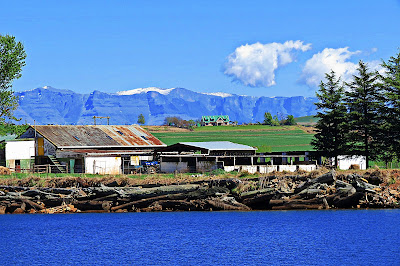"A fisherman is always hopeful - nearly always more hopeful than he has any good cause to be." Dark on the water. by Roderick L. Haig-Brown.
This was the case with me when I left yesterday morning to go fishing at my favourite still-water fishing spot, Grantchester dam on Defence farm in the Kamberg valley. How come I was fishing on a Monday morning? Well it was a public holiday, Heritage day, here in sunny SA.
Click to enlarge photos.
Stopped along the way to take a photo of this waterfall.
This waterfall on the Mooi River, (Afrikaans for "Pretty River") will be no more in a year or two's time. The Department of Water Affairs, is busy building a huge dam more than 10km downstream. Above these falls the Mooi River only has Brown trout, after the dam has been built, bass, yellow fish and carp will invade the upstream waters. Wild Brown trout have been in these waters for more than 120 years, who knows for how much longer. Nothing kills a river quicker than a dam.
A little further I took several photos (about six) to make this panorama of the Drakensberg. On the far left you have Giants Castle, where the Berg turns west, south west. On the far right the Berg turns in a long curve west north west and then north, forming the famous Amphitheatre of the Berg. The part of the Berg seen in the panorama is known as the central Berg. From Giants Castle on the left (south) is known as the southern Berg. From the Amphitheatre it's known as the northern Berg.
This is almost the same panorama as my header photo, from more to the south and not quite as zoomed in and includes more towards the north.
A panorama of Grantchester dam on Defence farm. As I have pointed out in a previous post here in the good old R of S. A, (Republic of South Africa) we also call the piece of water behind the dam wall, "the dam". All impoundments in SA are called dams, as some one has said it's one of those South African things. At this point the dam is more than a hundred meters wide. The dam extends way off to the left, (east) but to include it all would take too much space. My fly line can be seen lying on the water, where the fly line ends there is a steep drop-off into deep water.
Since I've started Blogging, (18 months ago) I have caught no trout in this still-water, yet my biggest trout, a hen of almost 24 inches, was caught here, (about 7lbs). Trout grow very fast in these waters as they are very fertile.
I think I've read too many fancy writing about trout fishing in still-water. Back then as a novice, it was cast and strip back as fast as I could, the startled trout would grab the strange, fast moving insect before they realised it was a fake, now I use all sort's of fancy retrieves, all of which the trout have seen before. (Well I need some excuse).
The fish in this piece of water are basically wild, put in as fingerling's, (3 inches) they grow large by surviving the natural dangers a wild trout would survive. It's definitely not a "put and take", water.
Looking across the water to the Berg in the background. Still some snow to be seen on the Berg.
The buildings are the milking parlour and some sheds. The parlour doesn't look like much on the outside, but is state of the art inside and milks several hundred dairy cows twice a day. South Africa has extremely strict laws concerning milking parlour hygiene and interior construction, (overkill in my opinion), and it has put many smaller dairy farmers out of business.
Another view of the Berg across the water, more to the south.
The water was actually quite murky and not quite as blue as the photo suggests, (though it usually is).





1 comment:
Hey Phillip. I'm a little confused here and need some help.
Since I've started Blogging, (18 months ago) I have caught no trout in this still-water, yet my biggest trout, a hen of almost 24 inches, was caught here, (about 7lbs).
You haven't caught any trout in this still water, but caught a 24 incher here. Do you not call that lake still water?
Mark
Post a Comment